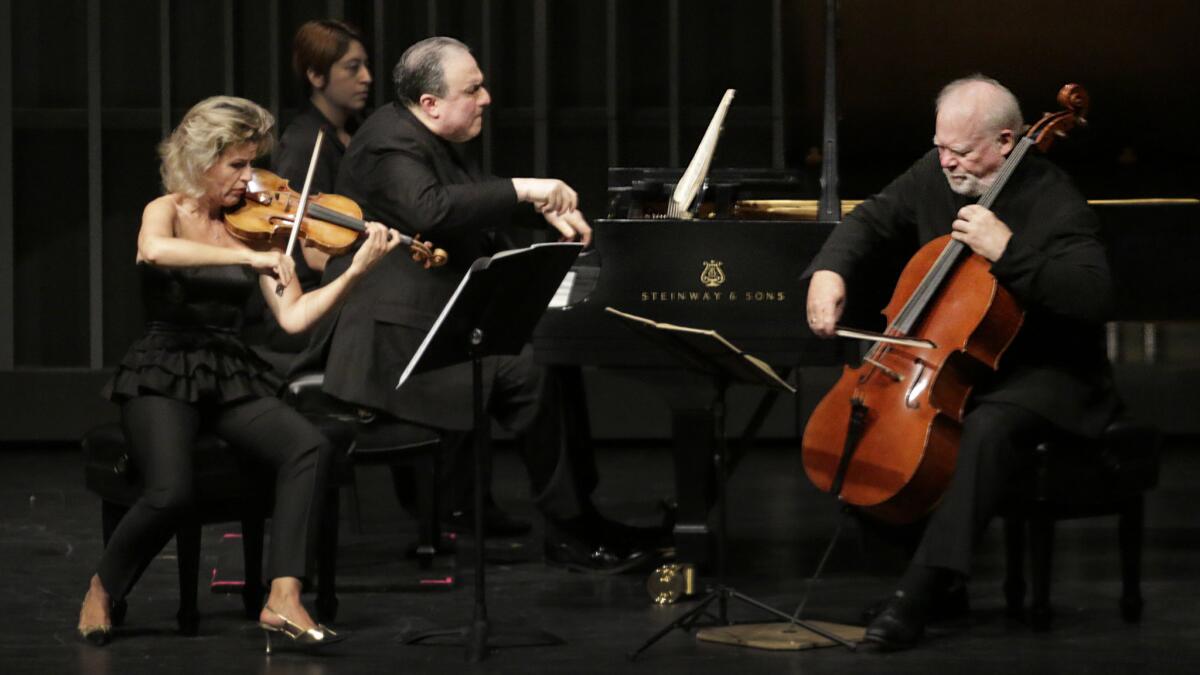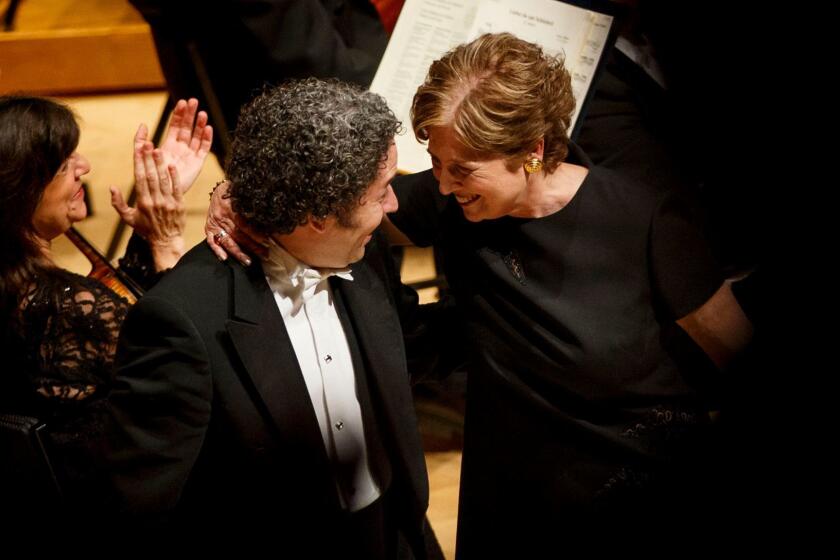Appreciation: Remembering Lynn Harrell, the singing cellist

- Share via
Tchaikovsky dedicated his Piano Trio, his finest work of chamber music, to the “memory of a great artist.” A recording of it with violinist Itzhak Perlman, pianist Vladimir Ashkenazy and cellist Lynn Harrell won a Grammy in 1981. That recording reminds us of a great artist, to say nothing of a mensch and gentle giant, common descriptions of the cellist in the flood of loving tributes pouring onto social media and classical music websites.
Harrell died at his Santa Monica home Monday at 76. No cause has been given, although his son told the Washington Post that his father had a history of heart problems. He was to have performed a recital at the Broad Stage next month but the concert was canceled, as all have been at the venue for the rest of the season, because of the coronavirus.
Among the tributes, Nigel Kennedy wrote that Harrell’s belief in the disillusioned, anti-establishment violinist’s validity saved his career at a crucial moment. Kennedy called Harrell the greatest cellist of his generation. Another violinist, Nadja Salerno-Sonnenberg, asserted she would have never become the kind of musician she is without his early encouragement.
Los Angeles Philharmonic principal guest conductor Susanna Mälkki, who studied cello, told the website Slipped Disc that thanks to Harrell’s “incredible energy,” her playing had changed just by sitting next to Harrell when she once turned pages for him in Japan. For cellist Gautier Capucon, Harrell had “a gorgeous and unique way of making the cello sing.” For cellist Steven Isserlis, the “high-spirited, larger-than-life, twinkly-eyed” Harrell was “the best colleague one could ever hope to have.” Seeing Harrell play when she was a little girl inspired Ani Aznavoorian to become a cellist.
Although I never met Harrell, all the above sounds right. I fell under his spell when his first solo recording, a recital with James Levine as pianist, came out in 1975. The cellist was long a familiar presence in Los Angeles. He was a regular L.A. Phil soloist throughout his career, and in the late 1980s and early 1990 he served as director of the orchestra’s summer training institute that Leonard Bernstein had founded.
At the time, he was also on the USC faculty and a major draw to its music department. When it came to chamber music, Harrell, though, was just as likely to help out a Brahms chamber music festival at the South Pasadena Public Library, as he did last June with characteristic generosity, as he was to collaborate with star performers.
If his name was on a program, I knew I needed to be there. There was something about just seeing him, bear-like, wrapped around his cello, embracing it, smothering it with a love both protective and ferocious.
The cello is the instrument that most resembles the human body. It is the instrument you hug to play. It is the instrument that produces a tone most likely to remind you of the human voice. Every cellist gets that.
But I’ve never heard a cellist make the instrument sing quite the way Harrell did. Despite his impressive physical presence — he had been an athlete in his youth and traded football for music — his sound was not particularly loud and never penetrating. He was anything but pushy when it came to the limelight. Rather, his way was to rely on the sheer persuasion of song and personality. He so got to the essence of that, everyone who played with him became like songbirds in a flock.
Where this came from is no mystery and has been much commented upon. Harrell’s father, who died when the cellist was 15, happened to be the great baritone and Metropolitan Opera star Mack Harrell, a singer capable of bringing grandeur to Wagner operas and deep compassion to Bach cantatas.
Deborah Borda, now head of the New York Philharmonic, talks leadership in the coronavirus crisis. Her strategy: Invest in a future that people want.
Harrell was the product of the other side as well. George Szell, the legendarily demanding Hungarian music director of the Cleveland Orchestra, invited an 18-year-old Harrell into the cello section of the orchestra. At 20, Harrell was promoted to principal cellist of what at the time had become maybe the most technically brilliant orchestra anywhere.
Although every report has it that the Tchaikovsky Trio recording was Harrell’s first Grammy, that’s not exactly true. During Harrell’s tenure with the Cleveland Orchestra, Pierre Boulez began his long association with the group. Two classic early Boulez-Cleveland recordings — Debussy’s “Images” and Stravinsky’s “Rite of Spring” — won the 1969 and 1970 Grammys for orchestral performance. Just listen to the cello section in them, with its almost supernatural glow yet ability to bring a supreme warmth to a conductor heralded for his supposed cool.
Harrell made a lot of recordings, but he is only moderately served by them. He was never the kind of big name who guaranteed topping the charts. The emphasis he put on teaching and charity in his later career, his greater devotion to music than the music business, often kept him from top billing.
That Tchaikovsky Trio recording is a perfect example. It was remastered in high resolution audio as part of a collection of Perlman recordings, and Harrell is barely acknowledged in the notes. The violin stands out with unnatural prominence, and Ashkenazy’s piano often covers the cello. Truth be told, it never deserved a Grammy, but that doesn’t mean Harrell’s presence is negligible. His caring songfulness, the heart of Tchaikovsky, is the glue.
Harrell can dominate. He made gripping recordings of the Elgar Cello Concerto with his old band in Cleveland that lack any of the sentimentality that the concerto has accrued over the years but are still potent in sentiment. He made a strikingly convincing recording of Henri Dutilleux’s pensive cello concerto, “Tout un Monde Lointain …”
His recording of the Bach solo cello suites rarely gets a nod among the more than 200, with every cellist attempting to say something original. Harrell’s is without posturing and seeming without effort. He simply sings them as if that were the most natural thing in the world, and the result is uniquely stunning.
In what looks to be his last recording, Harrell made a cameo appearance last year in Anne-Sophie Mutter’s hit John Williams’ recording, “Across the Stars,” playing the cello solo that opens “The Chairman’s Waltz,” from “Memoirs of a Geisha.” (It’s a recording that the violinist is slated to re-create with Williams and the L.A. Phil at the Hollywood Bowl on July 30, in the unlikely chance that there can be concerts at the Bowl this summer.)
Nothing might seem farther across the stars than this and that first solo recording of 1975, which has never been reissued on CD. It ends with Webern’s three short cello pieces given the most meaty and at the same time the most exquisite performance of them I have ever heard.
Harrell’s Williams on hi-res download and his Webern on vinyl, recorded 45 years apart but listened to back to back, make Hollywood’s quintessential composer and the composer who inspired the 1950s avant-garde no longer seem to exist in separate stylistic galaxies. Harrell uncovers the humanity in Webern’s substance and the substance in Williams’ humanity. That’s a model for us all.
More to Read
The biggest entertainment stories
Get our big stories about Hollywood, film, television, music, arts, culture and more right in your inbox as soon as they publish.
You may occasionally receive promotional content from the Los Angeles Times.












